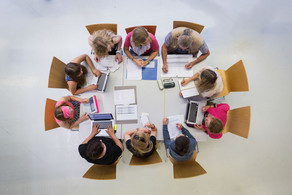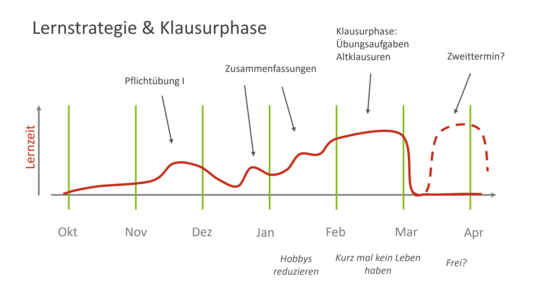The winter semester
How does the first semester work? If you're wondering, then this is the right page for you!
At the very beginning
At the beginning you should organize yourself: Apartment, accounts and math pre-course. During the orientation week you will get the full load of information and can get to know your fellow students.
The first weeks
In the very first week, you should really be present at every event, because exercise groups are distributed and the modules are explained. Which exercise takes place when, does something have to be handed in? Where is attendance compulsory? These and similar questions will be answered there. It's best to keep in mind that sometimes registrations open in the afternoons or evenings, which are assigned on a first-come, first-served basis: First come, first served. So the PC should not be too far away. You don't have to worry about not getting a spot, though. The most favorable dates (e.g. in free periods between lectures) can only be booked up quickly.
Practice groups usually do not take place yet. Sometimes there are introductory exercises to help you find your way through the material. However, there is no grace period for lecture content: It starts quite quickly. So grab your pen and paper (or tablet) and let's go! After the first two weeks, you'll notice how fast the lecture really is. It may take a while, but you'll get used to the pace.
You will notice that at the latest when you start doing the first exercises, the ugly grimace of procrastination will start to enter your life. As big as the temptation is to say, I'll do the exercises later, you have to be strong and resist it! So start right away and don't miss anything. Catching up quickly becomes difficult, if not impossible! More about procrastination on the next page.
The first compulsory exercises
There are tests in almost all modules, which you should prepare well for. In the preparation you will notice how much you have learned in the last weeks. So don't take on too much in the week with the test. These tests are the prerequisite to be allowed to write the exam: The exam admission (Klausurzulassung)! In addition to tests, there are often submissions, internship tasks or attendance at seminars. The pre-calculation of tasks is also a possible admission to the exam. All this is explained in detail in the introductory lecture, which is why you should not miss it, as written before.
A good summary of the lecture and exercise will help you to prepare. You can get tips by asking the exercise instructors or your contacts from higher semesters.
If you have passed the first compulsory exercises, then the pressure decreases a little - you have already been admitted to the exam. Or as one lecturer put it: "Now you have the opportunity to fail." Therefore, you should also write the other tests conscientiously, then you know that you are up to speed with the material and you will have it a little easier directly before the exam.
The time for summaries
"Learning is like a tree. For it to grow big, it needs time."
The sooner you start preparing for the exam, the better you will do in the end (on a statistical average, at least). Accordingly, use the free time around Christmas - usually two weeks, to summarize the lectures. After all, that's 2/3 of the content. It is very important to write the summaries yourself, because you are allowed to take them with you to the exams in GET and HöMa. Pay attention to the guidelines, otherwise your formulary will be collected in the exam and you can't use it. It is up to you whether you create a rough overview beforehand or directly write down the whole thing with a thin pen. But thin ballpoint pens should not be missing at your desk. Maybe highlighters will help you, too. You can find inspiration on how other students have done it in the E-Room. However, it is better to work with the materials from the department when you create your own formulary.
The great studying period
In January, at the latest, learning should begin. First write yourself a study plan with a calendar!
- When do you want to summarize which lecture?
- When do you want to calculate which exercise again - best with your exam formula collection?
- Are there old exams / additional material?
- When can you perhaps discuss questions with your colleagues or tackle the particularly difficult tasks?
- Take into account that there will always be new content that is relevant for the exam.
- Also think about sports and variety in your everyday life.
Even if this sounds like a lot of time spent in front of a desk, you are not alone! You are working together as a study group to get through the time. This way, exams can also have their charm and especially if new horizons can be opened all at once through the pressure and concentrated work, then it can be very motivating in itself.
First appointment or second appointment
At our department you are lucky to get a first and a second date for almost all exams, so you can choose when to write the exam. Deciding which date is the right one can sometimes be not so easy. Here's some info on that:
What are the advantages of choosing the first exam date?
- If you just don't pass the first date, you can use the second date. After that you have to wait one year for the next exam and in some modules you have to take the exam again.
- If you are sick on the first date (remember to get a medical certificate!), you can use the second date. After that you have to wait one year for the next exam and in some modules you also have to take the exam again.
- If you pass the first deadline, you have some time completely free and can go on vacation super relaxed and do lots of parties!
- Some lecturers take a reduced range of topics in the first term: This means that you have to learn a little less content. As a rule, however, every topic is relevant.
What are the advantages of choosing the second exam date directly?
- You have more time to prepare for difficult subjects.
- You can spread the exams over the whole lecture-free period and thus find ideal dates.
Three attempts
It is important that there are only three attempts per exam! So don't waste an attempt with half-baked preparation!!!
If the attempts are used up, it can happen that you cannot study this or comparable subjects at any German state university in which the corresponding module is included in the content. If this is the case, you can contact us, the department's student councelling service, the university's student advisory service or the AStA. You can find more information on our advising page. First rule: Cheer up, life goes on! "Life is what happens while you're making other plans."
The exam
In advance
- Do not forget to register for the exam! Usually up to two weeks before. Save the document with the registration confirmation somewhere, in case there is a mistake in the registration lists.
- Cancellation without consequences is usually possible up to one week before the exam.
- Later cancellations only with a doctor's certificate.
A checklist for what you actually always need:
- Identity card! (You can't come without it)
- Ballpoint pen (document-proof, no Tipp-Ex, no fountain pen, pencil only for preliminary drawing)
- Highlighter
- Drawing tool (triangle)
- Formulary (if allowed)
- Complex non-programmable calculator (if allowed)
- Drink
- Food (at 3h exams even more important, maybe dextrose helps you)
- If you have to take medicines with you, then of course those too.
- If necessary analog clock.
The atmosphere
- Strict! Absolute concentration.
- Follow the instructions of the supervisor. If you start too early or put down your pencil too late, this is an attempt to cheat*).
- A ringing cell phone can be considered an attempt to cheat*). Also, withholding your cell phone and smartwatch can also be classified as an attempt to cheat, so you should put all electronic devices away and turn them off before the exam.
- Often, your bag and jacket must be placed out of reach. Accessing them during the exam is not allowed.
- You will be seated far apart. The lecture halls are large.
- All materials at your workstation (formulary, case, etc.) are checked.
- An identity check will take place and will be checked against the formal attendance list.
*) Attempted cheating: will be officially punished by the examiner. This is documented by at least two persons of the lecture hall supervision. You have the right to formally object to this. Then it ends up in the examination board. You can ask the student council for advice about your options. In the case of attempted cheating, individual tasks or the exam itself can be graded as NB (failed); in severe cases, further measures are possible.
After the exam
Take your friends and drink a beer together. (Of course it can be something else tasty!) Don't just talk about the exam, there are so many other things in life.
Written by Leon Marcel Gerigk March 2022






